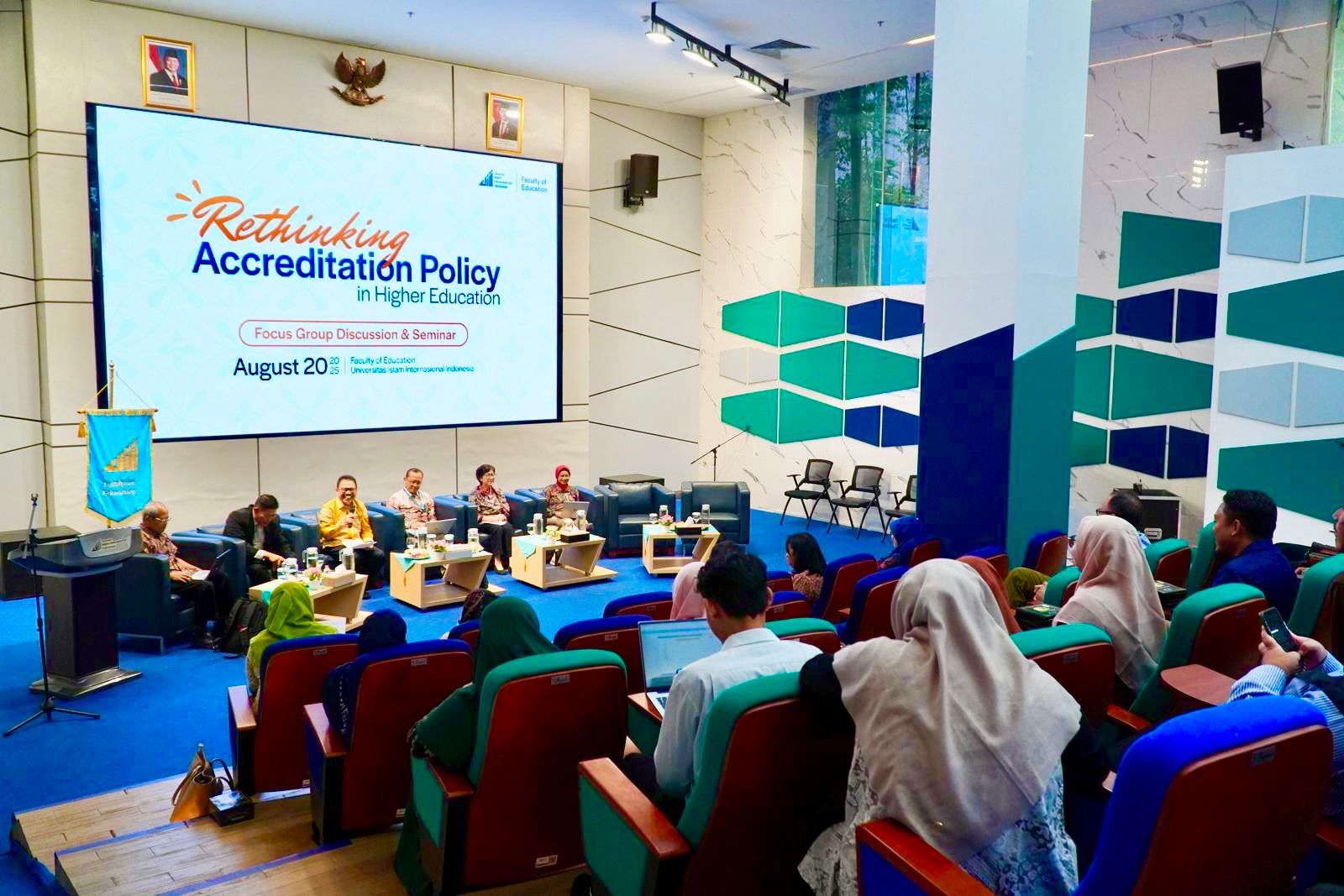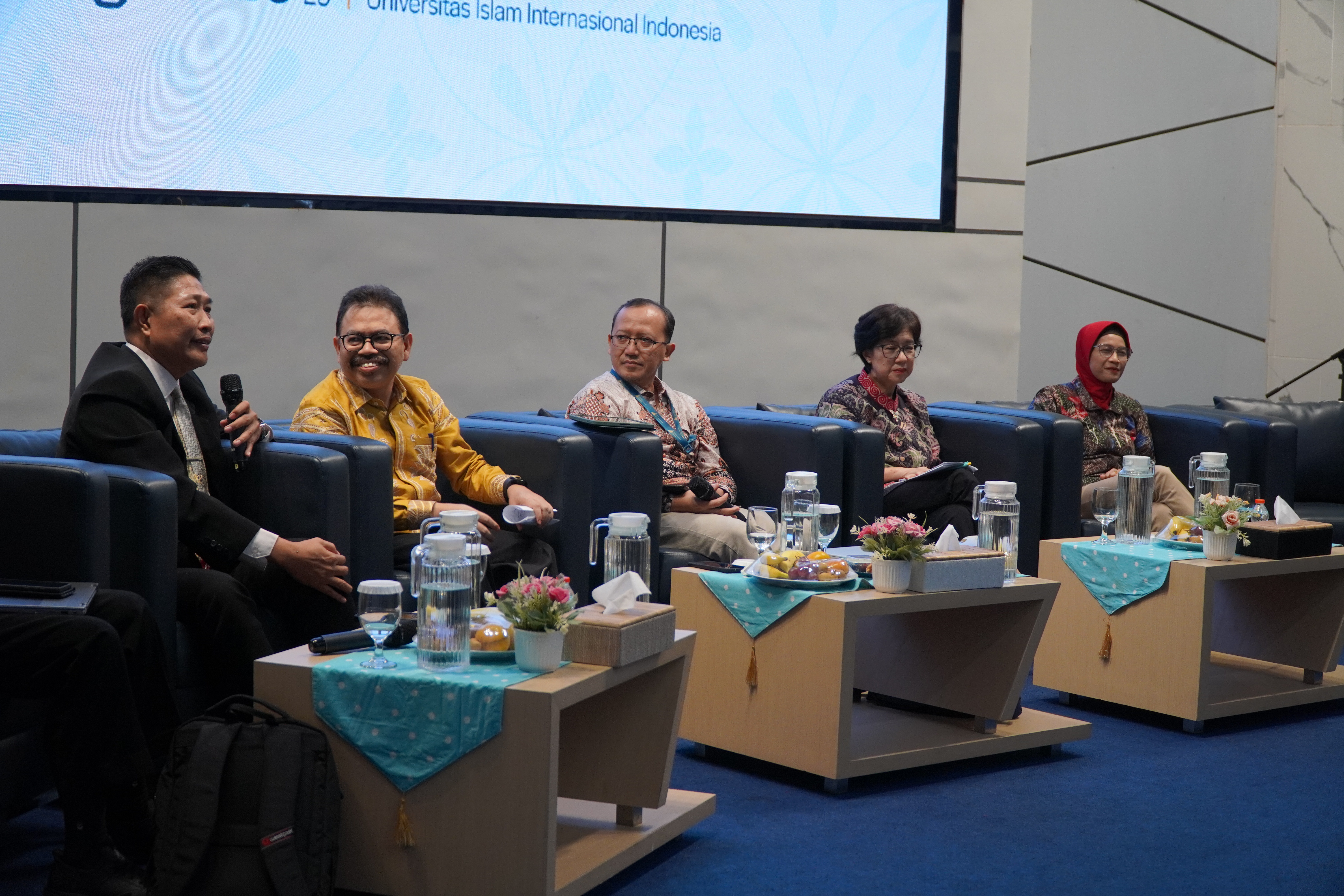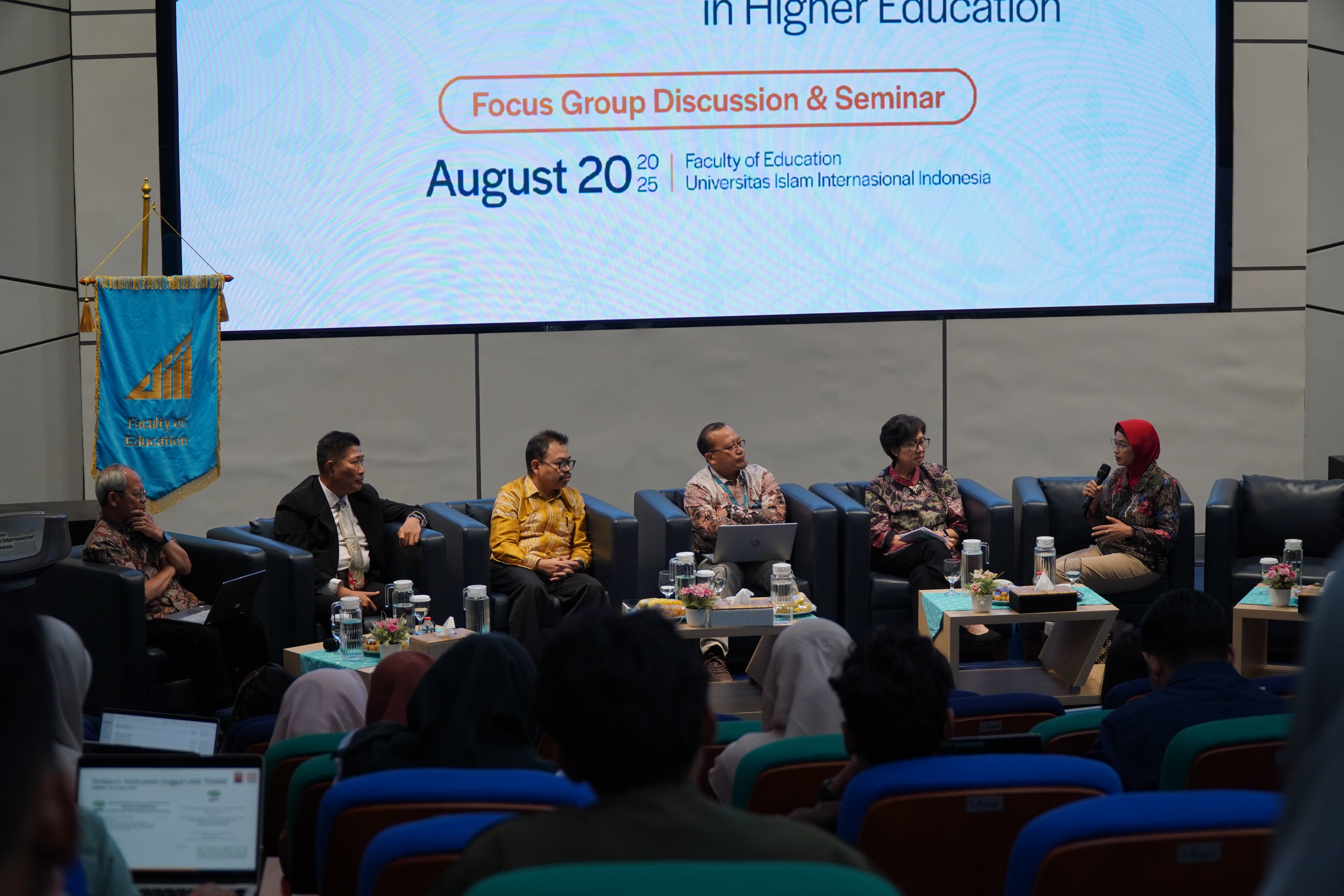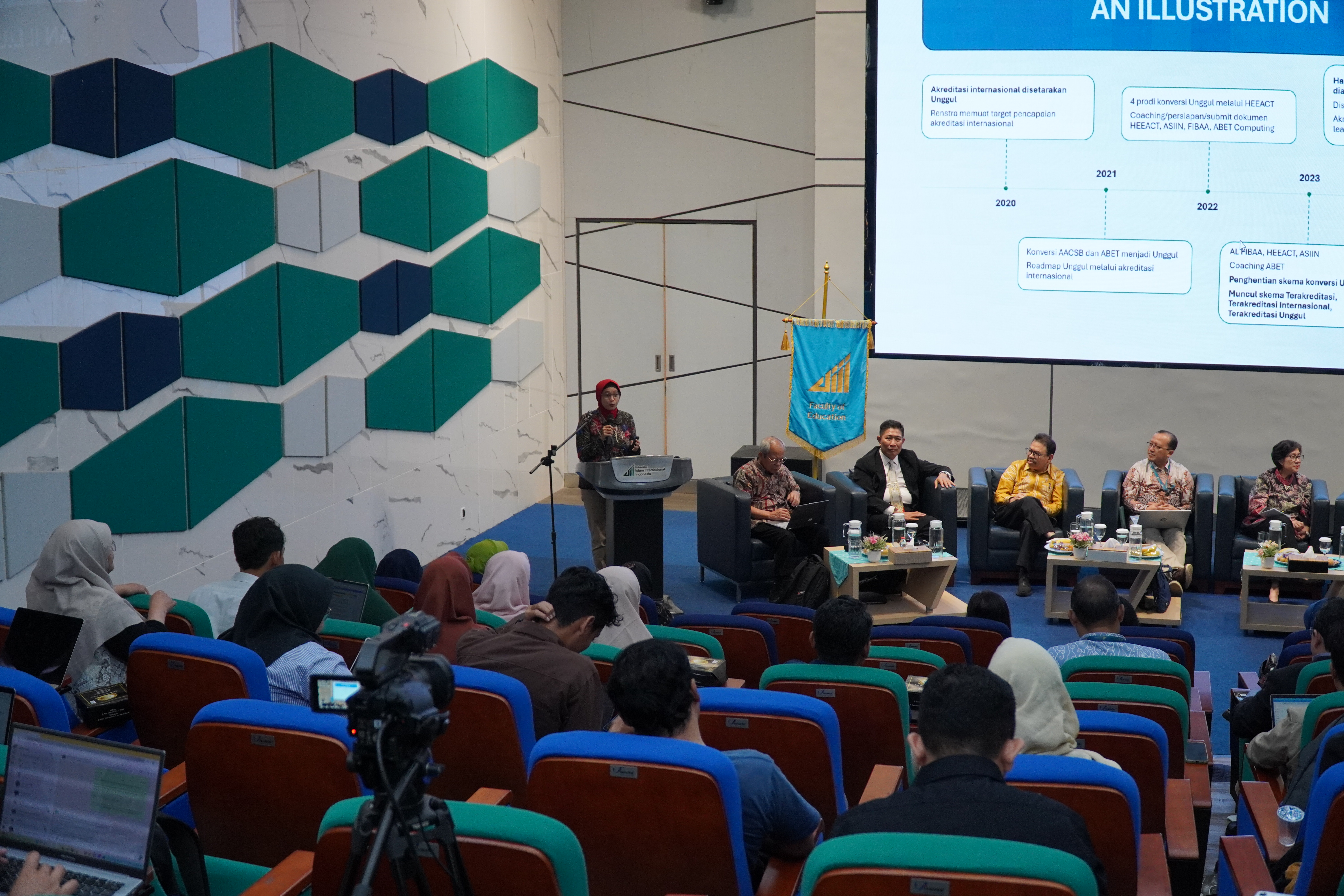September 29, 2025
Contributor & Photo by: Virda Lalitya Umam

In 2023, Indonesian government through the Ministry of Education, Culture, Research, and Technology issued a Regulation No. 53/2023 on Quality Assurance of Higher Education, introducing a binary accreditation system of higher education study programs to fall into either ‘Accredited’ or ‘Unaccredited.’
This new accreditation scheme is said to be more inclusive, contrasting the previous hierarchical system which categorized universities and study programs into ‘Unaccredited’, ‘Good’, ‘Very Good’, and ‘Excellent’. However, two years after the enactment, its implementation remained mainly unknown, causing confusion among higher education institutions (HEIs).
 As a response, the UIII Faculty of Education hosted a Focus Group Discussion (FGD) on August 20, 2025, under the title ‘Rethinking Accreditation Policy in Higher Education’. Moderated by lecturer Dr. Lukman Nul Hakim, the FGD brought together government representatives and higher education leaders, public and private, within and beyond Java, to share experiences and perspectives to address the issue.
As a response, the UIII Faculty of Education hosted a Focus Group Discussion (FGD) on August 20, 2025, under the title ‘Rethinking Accreditation Policy in Higher Education’. Moderated by lecturer Dr. Lukman Nul Hakim, the FGD brought together government representatives and higher education leaders, public and private, within and beyond Java, to share experiences and perspectives to address the issue.
Prof. Dr. H. Muchlas Samani, Chair of the Accreditation Council for Education (LAMDIK) started by clarifying the 2023 regulation’s status quo: “The revision is still underway” he said, whilst also acknowledging that the now-retracted legislation carried several risks, such as social problems due to the termination of unaccredited programs, resistance from HEIs, and eroding international trust.
 “These consequences do not fully reflect the vision of Accreditation Councils (LAM), since they also promote the improvement of education quality instead of only measuring it,” Prof Samani said.
“These consequences do not fully reflect the vision of Accreditation Councils (LAM), since they also promote the improvement of education quality instead of only measuring it,” Prof Samani said.
In response to the problem, Prof. H. Iwan Jazadi, Ph.D., from STKIP Paracendekia NW Sumbawa, West Nusa Tenggara, highlighted the plights of rural education institutions in underdeveloped areas—such as those located outside Java—which mostly lack essential government support. This vacuum, in turn, creates layers of burdens for basic academic activities, more so in accreditation.
Though also hailing from outside Java region, Prof. Dr. H. Mujiburrahman from Universitas Islam Negeri (UIN) Antasari Banjarmasin, South Kalimantan found the hierarchical system more appropriate, citing that accrediting is a multifaceted process. Nonetheless, he also stated that the current accreditation system still has many aspects to evaluate, particularly regarding data validity, administrative burdens, and over-generalized criteria.
 Meanwhile, Representing HEIs from Java, Prof. Dr. drg. Lindawati S. Kusdhany, Sp.Pros, Subsp.PKIKG, Director of Academic Quality Assurance at Universitas Indonesia (UI) detailed UI’s experiences and challenges in the face of accreditation. Despite being a long-standing university with extensive networks and support, they, too, are now pushed to become increasingly independent.
Meanwhile, Representing HEIs from Java, Prof. Dr. drg. Lindawati S. Kusdhany, Sp.Pros, Subsp.PKIKG, Director of Academic Quality Assurance at Universitas Indonesia (UI) detailed UI’s experiences and challenges in the face of accreditation. Despite being a long-standing university with extensive networks and support, they, too, are now pushed to become increasingly independent.
Similarly, Tatum Syarifah Adiningrum, Ph.D., Academic Development Senior Manager from Bina Nusantara (BINUS) University gave a behind-the-scenes of BINUS’s adaptation process to recent policy shifts as well as her own two cents on Indonesia’s accreditation scene, criticizing its constantly-changing standards.
During a moderated discussion session, Prof. Jazadi and Dr. Adiningrum argued that continuing the hierarchical system in current conditions would only deepen discrimination, the former stating desperate HEIs would even resort to cheating the system. Meanwhile, Dr. Adiningrum, came up with a harsher statement saying that Indonesians have a “fetish for inequality”, made apparent by the public penchant for rankings over substance, including accreditation.
On the other hand, Prof. Mujib and Prof. Kusdhany shared doubts that a binary system could truly take quality into consideration. Prof. Kusdhany expressed that hierarchical accreditation encourages continuous improvement, while Prof. Mujiburrahman viewed the discourse surrounding accreditation akin to the readiness for democracy—instead of waiting for everyone to be prepared enough, it is better to implement an ideal system from the get-go.
Despite being split on the ideal practices for today, all speakers agree that there is much to improve in the current accreditation system. The discussion also highlighted how accreditation, like many policies in Indonesia, is still unsustainable and overly leader-centric—regulations can be swayed, but the implications toward HEIs are drastic.
Recalibrating public perception is equally important to reduce discrimination towards institutions and programs without specific statuses. Through this FGD, UIII hopes to contribute meaningful groundwork in reforming Indonesia’s accreditation policies, to ensure students and institutions alike can pursue a version of excellence that best suits them.
Universitas Islam Internasional Indonesia